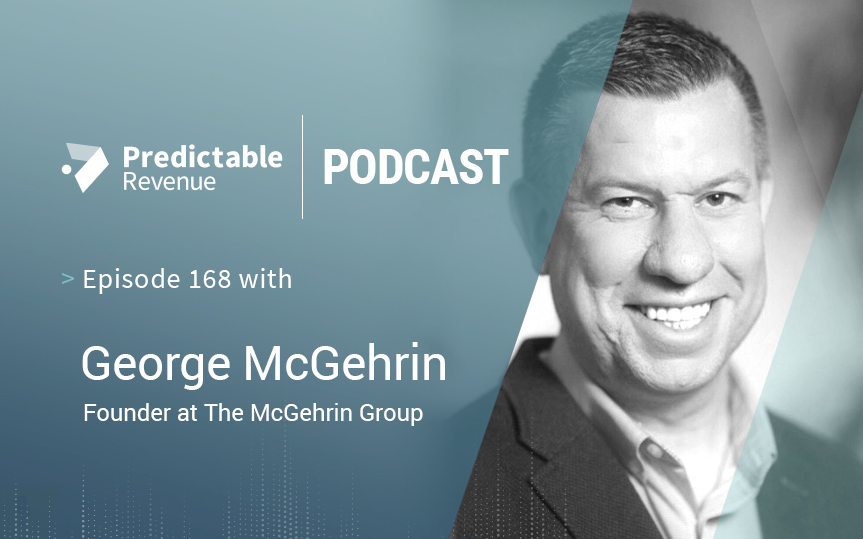The McGehrin Group Reviews: How To Get Clients To Pay You To Market To Them

For decades, executive candidates have asked George McGehrin for his help with their resumes. The McGehrin Group specializes in placing high-level executives in major corporations throughout the United States, and for 20 years, McGehrin Group reviews weren’t interested in resumes. So George turned those requests down.
Until one day, he didn’t. George explains in a recent episode of the Predictable Revenue Podcast how over 25% of The McGehrin Group’s revenue was developed by mistake.
How The McGehrin Group went from recruitment to resumes
McGehrin Group reviews had never considered resumes. It wasn’t until George watched the film Yes Man, a comedy where Jim Carrey’s character says “yes” to everything, that he decided to give resumes a shot. When the next candidate came through asking for resume help, George said yes.
George helped this CEO with their executive branding, which resulted in the CEO’s placement at a new company. This company happened to be coming to the end of their retainer with another executive placement firm, and George’s new CEO friend didn’t need to read McGehrin Group reviews to know how they worked. He offered George’s firm the contract.
This same CEO went on to introduce George to a friend with the same resume problem, and from there the cycle continued.
Today, 25% of The McGehrin Group’s revenue on the recruitment side comes from this one relationship. George works with someone one on one, and sooner or later The McGehrin Group places them and/or is hired at their new company. The result is a system where executives are paying The McGehrin Group to put them in the funnel.
A win-win for everyone
George maintains that this system is actually a win-win and judging by The McGehrin Group reviews, it’s clear his clients agree. These clients get a business partner–someone that can help them tell their story properly and land the placement they’ve been looking for.
George, in turn, has a direct line to executive-level decision-makers at new companies. The model works because The McGehrin Group is providing value to the customer first, which builds trust. This relationship is stronger than any marketing tool because, at the end of the day, people do business with people they trust.
The McGehrin Group reviews consistency theory
Consistency theory states that people are strongly motivated to maintain consistency in their actions. In business terms, people are more likely to want to buy from the same company again than go somewhere else, because they’ve bought from them before and had a good experience.
George’s stumbled-upon model is an example of tripwire marketing, “the practice of offering leads a low-cost product with the intention of selling them more expensive products later.”
This strategy poses an interesting question: What could you be offering at the beginning of your sales cycle, to get your foot in the door and start building that relationship?
A recession-proof system
While the recruiting business is subject to the peaks and valleys of the market, executive branding is not–and therein lies the genius of George’s model.
In a recession, executives who have lost their jobs are looking for work and in a bull market, new companies are looking to fill executive positions. The result is that the branding business finances the recruiting business.
Take a look at what your company can offer to finance the second, third, or fourth service in a time of crisis. This type of service should come in at a lower price, provide value regardless of the market, and create the opportunity for future follow-up.
How The McGehrin Group outcompetes larger companies
The McGehrin Group’s success in a competitive market comes down to two factors: stability and relationships.
A lot of recruiting companies deal with high salesperson turnover, the result being that candidates and organizations deal with dozens of different people throughout their relationship with a firm. This revolving door of salespeople isn’t good for building trust. And there is a lot of trust involved when you’re signing a $500,000 contract with $250,000 upfront.
George and his team at The McGehrin Group have worked to build strong client relationships. When COVID-19 first hit, The McGehrin Group sent out an email to everyone saying, “If you need anything from us, or if anyone in your family needs anything from us, just shoot us an email and we’ll see what we can do.”
This level of attentiveness doesn’t go unnoticed. When their large competitors were focused on the bottom line, The McGehrin Group prioritized human connection. Like when you pick a lawyer, you’re going to pick the person you trust whether they’re an employee of Baker McKenzie or some boutique firm.
Outbound techniques based on The McGehrin Group model
The McGehrin Group’s model opens the door for future opportunities, but follow-up is still a crucial part of the process. George’s team reaches out to clients on the branding and recruiting side periodically to see how things are going.
In order to stay top of mind, ask yourself these questions:
- Who are my customers?
- What are the jobs to be done that they could be looking for help with?
- What do they need help with outside of my product that we have knowledge in?
- Where else can we provide value?
When it comes down to it, the best thing to do is ask your customer. They know you, they know your offering, they’ve worked with you and seen what you can do. Ask them what else you could be doing to help people and what else they need help with.
Conclusion
George McGehrin stumbled onto a goldmine with his tripwire marketing style. He found a way to start a relationship, build trust, and gain a direct line of contact with executives at many different companies–all while his clients pay him for the privilege.
And while his discovery of this model may be a happy accident, George maintains that the real mistake was not getting there sooner by simply asking his clients what else they needed. So take his advice and look for the expertise your team already has that you’re not charging for, and use it.
NO TIME TO READ?
Listen On:
Experience and a lot of testing have shown us that it is possible to create email templates that people actually resonate with.
You don’t have to figure it out alone, whether you’re starting off as a sales representative, looking to improve your game or providing your team with expert advice, we have your back!
Transform your sales strategy with expert guidance. Connect with us for personalized consulting and coaching that turns challenges into opportunities for success.


